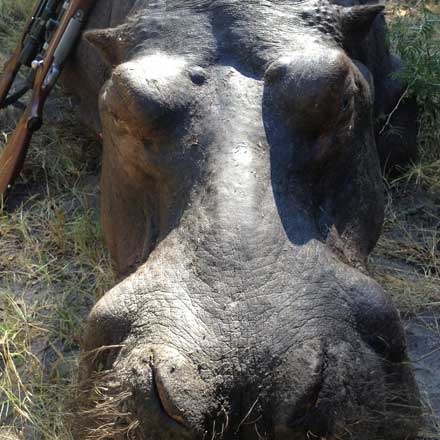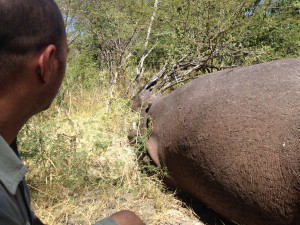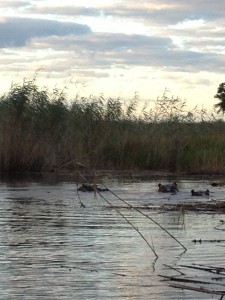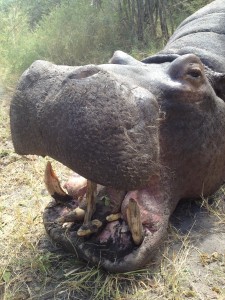
I have always been afraid of hippos. This year, I got the chance to hunt the massive
beast in the Caprivi Strip of Namibia. The only catch was that I had to hunt it on land.
Hunting a hippo on land is one of the most dangerous things a hunter can do. Hippos
are ferocious and territorial and are responsible for more deaths annually in Africa
than the buffalo and elephant combined. This was
going to be one serious adventure.
When I was a child, maybe 4 years old, my
parents went to Africa, but I stayed with my
grandparents. When they returned they told all
sorts of amazing stories about the magic of Africa,
but one story in particular caught my attention.
The story was about a river cruise in a tiny
outboard motor boat. The boat bumped a hippo,
and the hippo chased the boat. The story was
terrifying. My mom is a great story teller, and she
convinced me that hippos were bad news. I
was scared of hippos from that point on. When
someone would ask a group of us kids what we
were afraid of, most would answer spiders, or the
dark; I answered hippos.
I had mixed feelings about hunting a hippo. The
idea of being near one made me cringe, but I liked the concept of conquering my fears. I
thought of it as a final showdown with the beast that had give me nightmares as a child. I
borrowed a .375 CZ from one of the guides and sighted it in on the bench in the base
camp about 30 minutes from the Windhoek airport. We would be making the long drive up to the
Caprivi the next day. I have hunted with Omujeve Safaris many times.
They are like family to me, so I trusted them to guide me for this dangerous hunt.
Trusting your outfitter is crucial to the success of a hunt. If I was going to a hunt a hippo,
it had to be with people with whom I was comfortable. The fact that my friend, Corne
Kruger (Owner of Omujeve Safaris), insisted that I do the hunt on land only added to
my… let’s call it excitement.
Hunting a hippo on land is completely different from hunting one in the water. When a
hippo is hunted or shot in the water, there is little danger involved. Hippos are dangerous,
so there will always be some level of danger, but hunting them in the water the safest
way to do it. The hunter’s only difficult task is making a perfect shot on a small target.
The precision involved in making a perfect head shot on a hippo in the water is what
draws some hunters to this sort of hunt. Hunting a hippo on land is completely...
different
deal. Hippos are naturally more comfortable in water than on land, so finding them on
land while they are feeding is difficult. Hippos generally feed at night when it is not legal
to hunt them. Catching them on land in the early morning or evening is a hunter’s best
chance. Hippos are also much more aggressive on land. They will make a straight line
to the water. The hunter should always avoid being directly between a hippo and its
water. This makes for an almost certain charge.

The statistics for death by hippo are
staggering. The hippo kills more people per
year in Africa than any other animal. This is
largely because they are so territorial in the
water. Rural parts of Africa rely on their
rivers for water to bathe, drink, fish, and much
more. This forces people to enter the hippo
filled waters, and every so often a hippo will
get fed up with the intrusion and attack. It is
interesting to note that hippos are
vegetarians, so they do not attack humans for
food like crocodiles, lions, or other African
predators. Hippos simply have a bad attitude towards humans.
Hunting in the Caprivi Strip is completely new to me. I had never been that far north in
Namibia. The stretch of river that we were hunting is in the pan handle bordering
Zambia to the north and Botswana to the south. The Caprivi Strip has an interesting
history. The Germans named the Caprivi Strip after Chancellor General Count George
Leo Von Caprivi di Caprara di Montecuccoli. It was originally acquired by the Germans
in hopes that they could use the river as a trade route to the Indian Ocean, but they
didn’t realize that Victoria Falls would make that impossible. The Caprivi area has the
largest population of hippos in the country of Namibia. I had never seen so many hippos
in my life!
I was told that we would be driving the river in a boat and then walking the islands
looking for hippo. I expected to be knee deep in muck and grasses. When I arrived I
was informed that the rains were late, so there was much less water than we had
expected. This concentrates the pods of hippo in the water and makes the islands much
larger and dryer. Some islands were more than a kilometer...
wide. The drought
conditions also made the channels difficult to navigate. Areas that the boat could easily
pass the year before were now too shallow to go through.
We spent the first day trying to find navigable paths between islands and cutting new paths when there were none to be found. Cruising around in a river full of hippos is dangerous but cruising around in a shallow river is much more dangerous. We had to make sure that we could get in and out of the shallow areas easily so that we would not get stuck in case we had a charge.

The hunt began early the next morning. We set out on the boat looking for obvious
signs of hippo activity on the edges of the islands. Once we picked out some nice tracks
we would park the boat and follow the trails onto the islands. It was incredibly hot and
humid. The islands were thick with thorny vegetation and the walks across them were
nothing short of miserable. The first few islands showed lots of tracks, but nothing fresh
enough to get excited about. On one island we found the massive bottom jaw bone of a
Crocodile, but no other parts, and the bone had been baked in the sun for what looked
like years. In the afternoon we found a large pod of hippos in a lagoon. We stopped to
check them out and found that there were three bulls in the pod. We decided to get onto
the shore of a small island and wait to see if any of them would come out of the water.
One of the bulls was mostly submerged and sitting broadside. My guide, Pieter, and I
looked at each other and thought very seriously about taking the shot with the hippo in
the water. We had promised Corne that we would try to get the hippo on land, so we
passed on the perfect water head shot. It was only the beginning of the hunt, so we were
optimistic.
The next day we set out early and went back to the
spot where we had seen the big pod of hippos the
evening before, but they were nowhere to be found.
We decided to try some other islands in the area. We
landed on one large island and found some evidence
of hippo activity leading out of the water toward
the interior of the island, so we followed. We walked
for what seemed like an eternity in the blistering heat.
There...
were six of us walking on the hippo tracks:
Pieter, my cameraman Bill, Alexander the tracker,
two apprentices, and myself.
The island was mostly thick vegetation with some tall
trees and some low lying grassy clearings with reeds
sticking up that had obviously been under water the
year before. We took our time making our way
through to the interior of the island before we sent the younger guys back to bring the
boat around to other side to pick us up. There was no recent or exciting activity to give
us hope of finding something on this island, so we planned to make it to the other side
and then try the next island.
We picked up the pace as we headed to where the guys would meet us with the boat.
The four of us walked through some nasty thorn bush and out into a clearing when
Pieter stopped and dropped to his knees. I dropped too, then the guys behind me
dropped as well. There was a hippo standing just to our right, feeding along the edge of
the thick brush. We were directly between the hippo and the river’s edge, exactly where
we did not want to be. The hippo was only about 15-20 meters away and was
completely unaware of our presence.
The only problem was that I was prepared to take a head shot, so in my chamber was a
soft point bullet.The magazine underneath had two solids prepared for backup, but the
hippo’s head was down in the grass feeding. We were way to close to change the
bullets without the bull hearing us, and a soft bullet is not adequate for a shoulder shot,
so we hesitated. The bull heard us or smelled us and took off. Thankfully he ran into the
thick bush and not at us.
When we got up to the hippo I was utterly terrified.
I immediately switched my soft for a solid bullet, and Pieter lead us in pursuit of the
hippo. We crashed through the thick brush after the hippo that we could only hear and
not see. The sound of breaking branches gave away the hippos position, but the scrub
was so thick that we could barely keep track of the person in front of us. All of a sudden
Pieter stopped and put up his gun. I was startled by the sudden stop, and I put my gun
up as well. Pieter said “Shoot, shoot!” but I had still not seen the hippo. I finally made
eye contact with a very angry hippo that had stopped and turned to face us just on the
other side of a thick patch of bush. I instinctively took a few massive steps...
backwards
when I saw how close the hippo was, but then quickly got back to Pieter’s side and took
my shot; I watched the hippo take the bullet hard. I could see it plainly with my naked
eyes. Pieter backed me up as the hippo turned away from us and crashed through the
brush. We followed quickly, and put a few more shots in it as it went down in a clearing
nearby.

When we got up to the hippo, I was utterly terrified.
The hippo lay motionless, as if sleeping, on its belly. I
couldn’t believe that it was really dead. I kept waiting
for it to jump up and chomp us. I put another shot in,
just to make sure. The adrenaline pumping through
my body made my heart feel as if it was going to
burst. I don’t think I’ve ever reached that level of…
let’s go with excitement, ever in my life. The mission
was accomplished. We were able to get a hippo on
land and live to tell about it! It was a beautiful bull with
nice tusks and a massive body. The younger guys
heard the shots and arrived shortly after the hippo was
down. They were very disappointed that they missed
the excitement.
They are massive and as dangerous as it gets.
In retrospect, it was a very dangerous move to chase
after the hippo in the thick brush. I would definitely not recommend that course of action
to anyone, but Pieter was confident that the hippo would head through that brush and
out the other side toward the water. Our only chance of catching it would be in the thick
stuff. I trust Pieter, and it was his decision to make in that split second, so I followed right
after him. I still laugh when I tell the story of how we chased the hippo because it seems
so ridiculous to do something so dangerous, and yet, we did. Amazingly,it worked for us!
When I tell my hippo story, people always ask me, “So, are you over your fear of hippos?”
The answer is no. If anything, my fears were all realized; hippo are worthy of fear and
respect. They are massive and as dangerous as it gets. I will always have a healthy fear
of hippos. I’m proud that I achieved my goal, and I still feel as though standing my
ground and taking a shot instead of...
running scared was enough to say that I conquered
my fear. Hunting a hippo on land was the adventure of a lifetime; I will never forget the
heart pounding excitement of those final intense moments of the hunt. It is also nice to
know that the hippo I shot fed an entire Caprivian village. We ate some of the hippo as
well, despite our best efforts. It was a lot like meat flavored bubble gum.